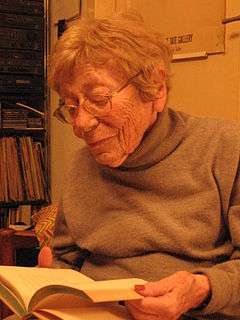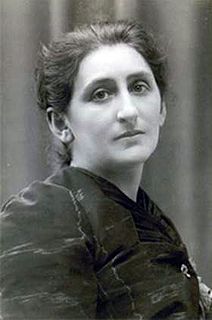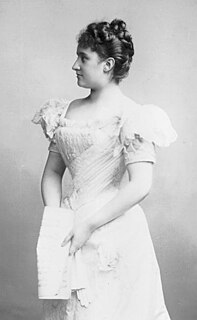
Clara Schumann was a German musician and composer, considered one of the most distinguished composers and pianists of the Romantic era. She exerted her influence over a 61-year concert career, changing the format and repertoire of the piano recital, while also having composed a body of work including various piano concertos, chamber works, and choral pieces. She was married to composer Robert Schumann, and together they encouraged and maintained a close relationship with Johannes Brahms. She was the first to perform publicly any work by Brahms, notably the Variations and Fugue on a Theme by Handel. She was also an influential piano educator at the Hoch Conservatory in Frankfurt.

Alma Maria Mahler Gropius Werfel was a Viennese-born composer, author, editor and socialite. At fifteen, she was mentored by Max Burckhard. Musically active from her early years, she was the composer of at least 17 songs for voice and piano.

The Vienna Central Cemetery is one of the largest cemeteries in the world by number of interred, and is the most famous cemetery among Vienna's nearly 50 cemeteries.
Maria Anna Schicklgruber was the mother of Alois Hitler, and the paternal grandmother of Adolf Hitler.
Ilse Aichinger was an Austrian writer known for her accounts of her persecution by the Nazis because of her Jewish ancestry. She wrote poems, short stories and radio plays, and won multiple European literary prizes.

Maria Altmann was an Austrian-American Jewish refugee from Austria, who fled her home country after it was occupied by the Nazis. She is noted for her ultimately successful legal campaign to reclaim from the Government of Austria five family-owned paintings by the artist Gustav Klimt which were stolen by the Nazis during World War II.
Ilona Eibenschütz was a Hungarian pianist.

Ellen Müller-Preis, née Preis, was German-born Austrian Olympic-champion foil fencer.

Theodor Otto Helm was an Austrian music critic and writer.
Božena Angelova is a Slovenian violinist. She has recorded for the Slovenian Broadcasting Company and has performed as a soloist with the Slovenian Philharmonic Orchestra and the Carinthian symphony orchestra, amongst others.

Ilse Maria Aschner, née Römer, was an Austrian journalist and survivor of the Holocaust.
Greta Loebl Schreyer, born Greta Loebl, was an Austrian-American, Jewish jewelry designer and painter. She survived the Holocaust and died in New York City.

Woman in Gold is a 2015 biographical drama film directed by Simon Curtis and written by Alexi Kaye Campbell. The film stars Helen Mirren, Ryan Reynolds, Daniel Brühl, Katie Holmes, Tatiana Maslany, Max Irons, Charles Dance, Elizabeth McGovern, and Jonathan Pryce.

Broncia Koller-Pinell was an Austrian Expressionist painter who specialized in portraits and still-lifes.
A Friendship In Vienna is a 1988 Disney Channel film based on Doris Orgel's popular children's book The Devil in Vienna. The film starred Jane Alexander, Stephen Macht and Edward Asner and premiered August 27, 1988.

Amalie Joachim, née Schneeweiss was an Austrian-German contralto, working in opera and concert and as voice teacher. She was the wife of the violinist Joseph Joachim, and a friend of Clara Schumann and Johannes Brahms with whom she made international tours.

Lula Mysz-Gmeiner was a German concert contralto and mezzo-soprano born in Transylvania, who performed lieder recitals in Europe and the United States. She was an academic voice teacher in Berlin and taught both Elisabeth Schwarzkopf and Peter Anders.
Ilse von Twardowski or Ilse Twardowski-Conrat was an Austrian sculptor. She created many noted sculptures. She took her own life in 1942 as a result of the holocaust.













